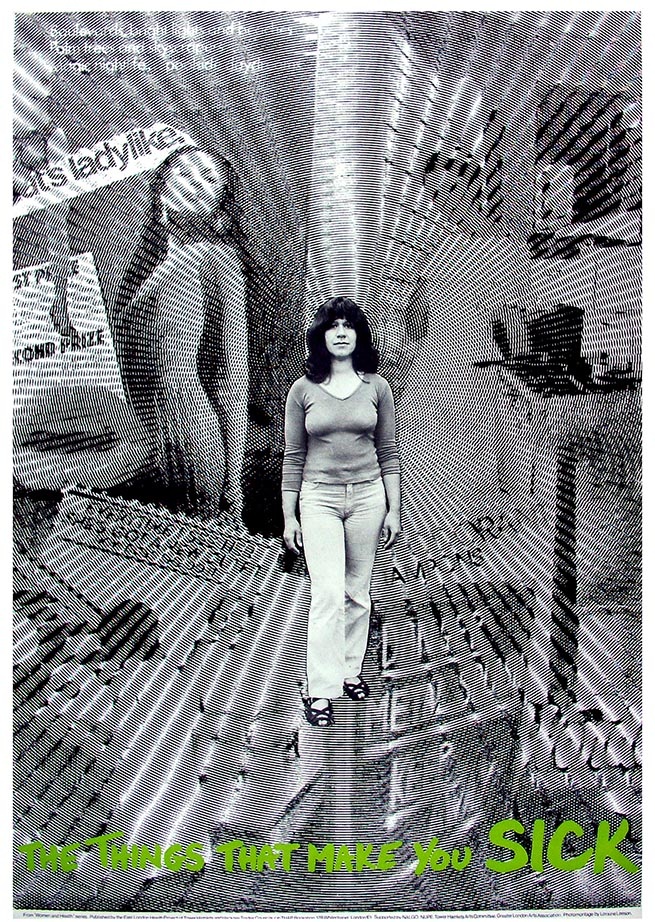The Things That Make You Sick: East London Health Campaigning, 1977-1980
6 May 2017 – 9 Jul 2017
Preview: 5 May 2017
The ICA Fox Reading Room presents the collaborative and socially-engaged work of Peter Dunn and Loraine Leeson produced between 1977 and 1980, which focused on health issues of the time: the Bethnal Green Hospital Campaign (1977-78) and the East London Health Project (1978- 1980).
By the mid-1970s, the National Health Service suffered severe cuts which were implemented by the James Callaghan government (1974-1979) as a result of funding restrictions from the International Monetary Fund. This led to the closure of a number of smaller hospitals across the country and the overall diminishing of the service’s reach. The Bethnal Green Hospital Campaign and the East London Health Project both sought to tackle these issues through a process of close collaboration and engagement with the local community and local councils in East London.
This resulted in a series of posters as well as a video and exhibition to raise awareness around health issues in the UK at the time: from hospital closures and mental health to abortion, contraception and women’s role more broadly in society. While the posters were informational and functional by nature, they also used some of the aesthetic tropes of appropriation and collage found in the politically-engaged work of early 20th century German artist John Heartfield and Russian Constructivist Alexander Rodchenko.
The Bethnal Green Hospital Campaign marked the start of a long period of collaboration between Dunn and Leeson. Following the announcement of the hospital’s closure, its medical staff decided to occupy the site and continue to care for its patients. Dunn and Leeson were approached by Dan Jones, a trade unionist and member of Tower Hamlets Trades Council, to make a video about the campaign. Entitled Emergency, it was followed by a series of posters and an exhibition in the hospital foyer to advise visitors as to why it was in occupation. The hospital was initially saved as a result of the campaign, though later closed under the Thatcher government and has now been converted into private homes.
Following the Bethnal Green Hospital Campaign, Dunn and Leeson were invited to join a steering committee involving representatives of health workers’ unions, a local trades council and health campaign, to produce visual materials that would inform the public on the potential effects of the increasing cuts in health services. This group, known as the East London Health Project, discussed suitable formats for this information and arrived at the notion of a ‘visual pamphlet’, resulting in a series of posters by the artists containing information for display in doctors’ surgeries and hospital waiting rooms. These addressed both general concerns, such as cuts to the NHS, but also issues pertaining specifically to women such as abortion, contraception and the impact of wider social issues on women’s health.
These posters were also shown at the ICA in 1980 as part of the exhibition Issues: Social Strategies by Women Artists (14 Nov– 21 Dec 1980), curated by the American feminist thinker Lucy Lippard, and which was last of a series of three landmark exhibitions (Women’s Images of Men 4 Oct – 26 Oct 1980 and About Time: Video, Performance and Installation by 21 Women Artists 30 Oct – 9 Nov 1980) that cantered on feminist art of the time.
The conditions that gave rise to the Bethnal Green Hospital Campaign and East London Health Project are echoed today with the funding crisis and increasing privatisation of the NHS, together with marches against public spending cuts and for women’s rights. Through their aesthetic and collaborative qualities, the visual work for both projects is testament to art’s capacity as a tool for social and political action and the role of the artist as an agent for social change.
Artist biographies
-
Peter Dunn
Peter Dunn is Director of ART.e @ the art of change which he founded in 2001 as a new departure in the relationship between Art, Regeneration, Technologies and environment (hence the name ART.e) and as a legacy organisation of The Art of Change, Docklands Community Poster Project and East London Health Project. He has public artworks in Portsmouth, Stevenage, Gravesend, Bournemouth, Oxford and London Boroughs of Tower Hamlets, Newham, Camden & Islington, Hackney, Southwark and Lewisham. Dunn has written articles for publications in this country and abroad on themes related to art, constituencies, interventions and collaborations and more recently in relation to digital media and the Network Society. He has lectured widely, including as Distinguished Visiting Professor at University of California, Davis and the Cranbrook Academy in Detroit. He was Course Director of the M.A. in Art and Media Practice and Director of Studies (PhD) at University of Westminster between 2004 and11.
-
Loraine Leeson
Loraine Leeson is a visual artist particularly known for her work with the communities of East London. She and Peter Dunn met as undergraduates in the seventies and collaborated for the following twenty years, founding the Docklands Community Poster Project in the eighties then The Art of Change in the nineties. Loraine’s subsequent work through cSPACE has received a Media Trust Inspiring Voices award and Olympic Inspire Mark, while her public artwork The Catch involving three hundred children, college and university students was voted a London 2012 Landmark. A current project Active Energy recently received RegenSW’s Best Arts and Green Energy award. Leeson is Senior Research Fellow at the University of Westminster and teaches Fine Art Social Practice at Middlesex University, where she has developed a new MA in Art and Social Practice. Her book Art: Process: Change – inside a socially situated practice is to be published by Routledge next year.

/index.jpg?itok=BFXEB2-G)